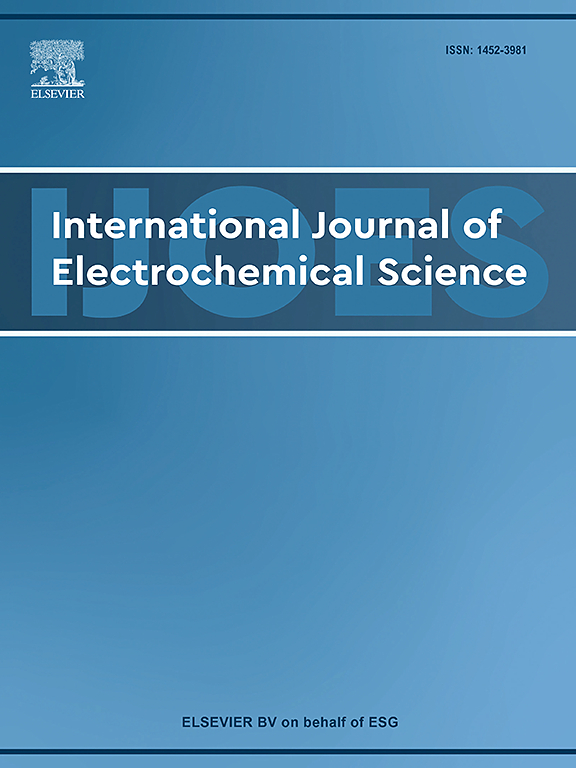用于快速灵敏检测18型人乳头瘤病毒的即时电化学DNA传感器
IF 2.4
4区 化学
Q4 ELECTROCHEMISTRY
International Journal of Electrochemical Science
Pub Date : 2025-05-19
DOI:10.1016/j.ijoes.2025.101074
引用次数: 0
摘要
我们报道了一种基于纸的电化学DNA生物传感器的发展,用于在护理点快速灵敏地检测人乳头瘤病毒18型(HPV 18)。该传感器将一个三电极系统集成到蜡纹纤维素基板上,工作电极使用氧化石墨烯-金纳米颗粒(GO-AuNP)纳米复合材料进行修饰。这种纳米结构的表面显著增强了探针的固定化和电子转移,实现了可靠的信号转导。通过EDC/NHS化学方法将HPV 18特异性单链DNA探针共价连接,并使用差分脉冲伏安法(DPV)检测靶杂交。传感器在1 fM ~ 10 pM范围内呈线性响应,检出限低至0.3 fM,相关系数(R²)为0.993。选择性测试显示,完全互补序列的信号下降70 %,而不匹配和非互补链诱导的电流变化明显较小(10-45 %)。加标样品的回收率研究表明,在10 fM至20 pM的浓度范围内,准确度水平在91.5 %至97.4% %之间。检测在30 分钟内完成,只需要10 µL的样品。稳定性评估显示,在4°C下储存4周后,信号保留率为88% %。与荧光或比色法不同,这种传感器不需要标记和复杂的仪器,使其特别适合资源有限的环境。低成本制造,高灵敏度和便携式操作的协同作用使该设备成为早期HPV 18筛查和及时临床干预的有力工具。本文章由计算机程序翻译,如有差异,请以英文原文为准。
A point-of-care electrochemical DNA sensor for rapid and sensitive detection of human papillomavirus type 18
We report the development of a paper-based electrochemical DNA biosensor for the rapid and sensitive detection of human papillomavirus type 18 (HPV 18) at the point of care. The sensor integrates a three-electrode system onto a wax-patterned cellulose substrate, with the working electrode modified using a graphene oxide–gold nanoparticle (GO–AuNP) nanocomposite. This nanostructured surface significantly enhances probe immobilization and electron transfer, enabling reliable signal transduction. Single-stranded DNA probes specific to HPV 18 were covalently attached via EDC/NHS chemistry, and target hybridization was detected using differential pulse voltammetry (DPV). The sensor exhibited a linear response from 1 fM to 10 pM, with a detection limit as low as 0.3 fM and a correlation coefficient (R²) of 0.993. Selectivity tests revealed a 70 % signal drop for fully complementary sequences, while mismatched and non-complementary strands induced significantly smaller current changes (10–45 %). Recovery studies in spiked samples demonstrated accuracy levels between 91.5 % and 97.4 % across concentrations from 10 fM to 20 pM. The assay was completed within 30 minutes and required only 10 µL of sample. Stability assessments showed signal retention of 88 % after four weeks of storage at 4 °C. Unlike fluorescence or colorimetric methods, this sensor eliminates the need for labeling and complex instrumentation, making it especially suitable for resource-limited environments. The synergy of low-cost fabrication, high sensitivity, and portable operation positions this device as a powerful tool for early-stage HPV 18 screening and timely clinical intervention.
求助全文
通过发布文献求助,成功后即可免费获取论文全文。
去求助
来源期刊
CiteScore
3.00
自引率
20.00%
发文量
714
审稿时长
2.6 months
期刊介绍:
International Journal of Electrochemical Science is a peer-reviewed, open access journal that publishes original research articles, short communications as well as review articles in all areas of electrochemistry: Scope - Theoretical and Computational Electrochemistry - Processes on Electrodes - Electroanalytical Chemistry and Sensor Science - Corrosion - Electrochemical Energy Conversion and Storage - Electrochemical Engineering - Coatings - Electrochemical Synthesis - Bioelectrochemistry - Molecular Electrochemistry

 求助内容:
求助内容: 应助结果提醒方式:
应助结果提醒方式:


